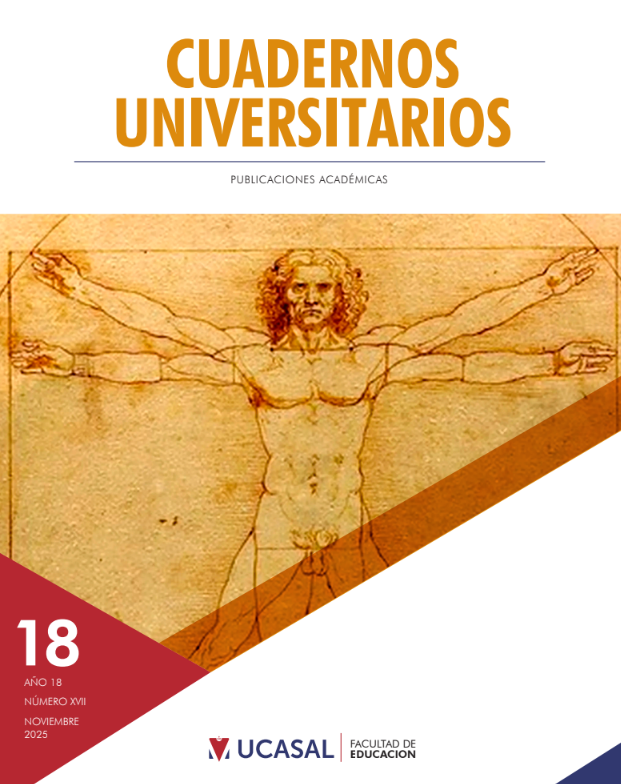El enfoque por competencias en la carrera de abogacía de la Universidad Católica de Salta (UCASAL)
THE SKILLS-BASED APPROACH IN THE AGOBACY COURSE AT THE CATHOLIC UNIVERSITY OF SALTA (UCASAL)
Resumen
Este trabajo refleja el resultado final del proyecto de investigación “Enseñanza y aprendizaje por competencias en la carrera de Abogacía de la Universidad Católica de Salta (UCASAL)”. La investigación buscó indagar sobre las competencias definidas por el modelo educativo de la UCASAL y si éstas se reflejan de manera explícita y/o implícita en los programas de la carrera en las modalidades presencial y a distancia. Para ello se analizaron todos los programas de la carrera y, con esa base, se aplicaron encuestas a todos los docentes y se realizó un focus group con aquellos que integran cátedras que están reformulando sus programas en base a objetivos en programas en base a competencias.
Se efectuó un análisis cuantitativo y cualitativo de los datos obtenidos. Los resultados alcanzados indican que existe una escasa referencia explícita al término de competencias desde una perspectiva pedagógica y una dispar presencia de las competencias genéricas establecidas por la Universidad, tanto entre las asignaturas como entre los años de cursado de la carrera. Implícitamente se han identificado un mayor número de dichas competencias, aunque se observa una gran dispersión en cuanto a su tipología y su recurrencia. Con respecto a las opiniones vertidas por los docentes, puede observarse que la mayoría declara conocer las competencias transversales de la UCASAL y específicas de la carrera y que reconocen la importancia de este nuevo enfoque, pero que se requiere de capacitación y tiempo para poder implementarlo en sus respectivas cátedras.
Descargas
Citas
Arellano Correa, S. (2014). “Enfoque curricular basado en Competencias: Proceso descriptivo del cambio en Carreras de educación en Universidades Privadas de Santiago de Chile”. Tesis Doctoral, Universitat de Barcelona. En https://www.tesisenred.net/handle/10803/260470#page=6
Díaz Barriga, A. (2006). “El enfoque de competencias en la educación. ¿Una alternativa o un disfraz de cambio?”. Perfiles educativos, 28 (111), enero-marzo, pp. 7-36. En https://www.redalyc.org/pdf/132/13211102.pdf
Morales López, S.; Hershberger del Arenal, R.; Acosta Arreguín, E. (2020). “Evaluación por competencias: ¿cómo se hace?”. Revista de la Facultad de Medicina, 63 (3), Mayo-Junio, pp. 46-56. En https://www.scielo.org.mx/pdf/facmed/v63n3/2448-4865-facmed-63-03-46.pdf
Tobón, S. (2013). Formación integral y competencias. Pensamiento complejo, currículo, didáctica y evaluación, (4ta. Ed.), Bogotá: ECOE.
Vargas-Murillo, G. (2019). Competencias digitales y su integración con herramientas tecnológicas en educación superior. Cuadernos Hospital de Clínicas, 60(1), 88-94. Recuperado en 12 de octubre de 2024, de http://www.scielo.org.bo/scielo.php?script=sci_arttext&pid=S1652-67762019000100013&lng=es&tlng=es
Toledo, V.; Celíope, S.; Moreno Fleming, M.P.; Rainero, M. V. (2024). “Enseñanza y aprendizaje por competencias en la carrera de abogacía de la Universidad Católica de Salta (UCASAL)”. Revista perspectivas de las ciencias económicas y jurídicas, 14 (2), pp. 43-60. En https://ojs.unlpam.edu.ar/index.php/perspectivas/article/view/8232
Normativa
Estándares para la Carrera de Abogacía. CONEAU. Anexo I. https://www.coneau.gob.ar/archivos/resoluciones/anexo-res3401.pdf.
Resolución Rectoral Nº 969/21. Modelo Educativo de la Universidad Católica de Salta (UCASAL).
Derechos de autor 2025 Victor Fabio Toledo

Esta obra está bajo licencia internacional Creative Commons Reconocimiento-NoComercial-CompartirIgual 4.0.







